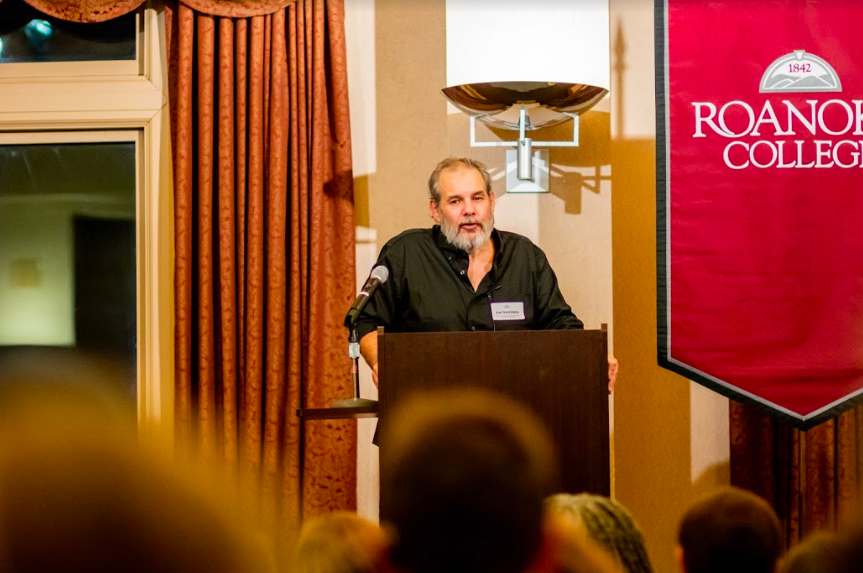Written by Bradley Bommarito
Last Tuesday, Joseph Giarratano shared his experiences of being on Virginia’s death row for a crime that many believe he did not commit to a packed audience in the Wortmann Ballroom. Sponsored by the James C. & S. Maynard Turk Pre-Law Program’s Gentry Locke Speakers Series, this event painted a sobering picture of Virginia’s deeply flawed criminal justice and corrections systems. Joseph Giarratano was paroled in December of 2017 after spending almost 40 years in prison. He currently works for the Innocence Project at the University of Virginia School of Law.
“It was only through a stroke of luck and attorneys working for free that the few people who are exonerated survive,” said Giarratano.
Giarratano detailed his painful journey from the beginning, focusing on how the corrections system dehumanized him and those around him. At one point he was suddenly transferred to a supermax prison in Utah, where he was kept in solitary confinement for 23 hours per day, drugged with the strong antipsychotic thorazine, and illegally tortured under the authorization of many of the prison administrators who were later arrested for performing extreme torture at the Ahu Ghraib prison complex in Iraq.
“Prisons function as predatory environments. The best our prison system can do is make a conducive environment for self-growth and positive change. Our system is built on retribution. At some point that punishment has to stop,” said Giarratano.
Giarratano advocates for major changes in Virginia’s corrections system and the systems in other states.
“I had no responsibility [on the inside], and that creates dependence. Give them something that they can take pride and joy in. We have to fix the system, and the fix isn’t going to happen from within. It’s people like you who will bring about that change,” said Giarratano.
Agreeing with most contemporary criminal justice scholars, Giarratano believes that “tough on crime” statutes cause far more harm than good.
“You hear politicians saying they’re getting tough on crime, and it’s not working. Something’s wrong with that picture. And there’s no magic bullet to fix that. The victims need a voice. They need to be heard,” said Giarratano.
He now dedicates his life to advocating for the falsely imprisoned. He works as a paralegal and has filed many lawsuits to help exonerate or secure more humane conditions for prisoners, some of whom he was friends with during his incarceration.
“I want to be the best human being I can be, and the only way I can do that is to give back. I feel responsible to help, and I’m able to do that because people like you support me. People caring makes all the difference. We have the programs, but unless we treat [prisoners] as human beings it’s not going to make a difference,” said Giarratano.
For students who wish to make a difference in some way, Giarratano encourages civic advocacy and taking action such as visiting prisons and enrolling in an RC criminal justice class that allows students and Roanoke County jail inmates to collaboratively learn the same course material.
“I would encourage students to support the Inside Out Program and to write their legislators to let them know they are being held accountable. You pay taxes for prisons, you can go into the prisons,” said Giarratano.
The death penalty is currently legal in 30 states, but many states do not use it often anymore due to the litigation and cost involved. Because the innocence rate is 4.1 percent but the death row exoneration rate is only 1.6 percent, there is considerable evidence to suggest that an untold number of innocent people have died at the hand of state.
“We’ve had over 100 exonerations based on forensic in the past few decades, and one in five involve false confessions. Why do we kill to show that killing is wrong? They think that people are determined from committing heinous crimes because they are afraid of being put to death, and there’s little to no evidence that it’s a crime deterrence,” said Dr. Todd Peppers, the Henry H. & Trudye H. Fowler Professor of Public Affairs at RC.
Rising costs have resulted in the gradual decline of the use of the death penalty, and Peppers predicts that controversial punishment will recede in popularity over the next few decades for this reason.
“It costs about $1 million more in a capital murder case to try, convict, and execute someone rather than to incarcerate them for life. I think that the death penalty is going to die not due to moral repulsion, but caused by shrinking state budgets and outrage over how much it costs taxpayers. We’re starting to see a trend across the country of states abandoning the death penalty due to cost,” said Peppers.




